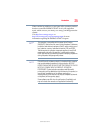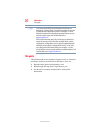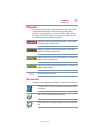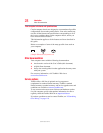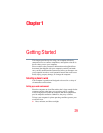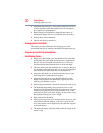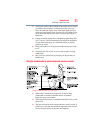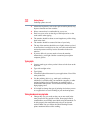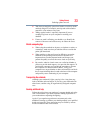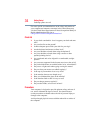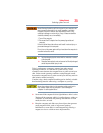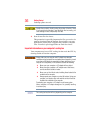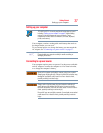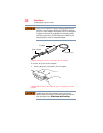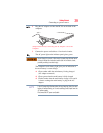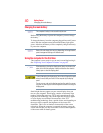
33
Getting Started
Selecting a place to work
❖ Take short, strategically spaced rest breaks to avoid eye strain
and body fatigue. For example, stand up and walk around or
stretch for a few minutes every hour.
❖ Taking regular breaks is especially important if you are
working long hours on your computer or working on a
deadline.
❖ If stress at work is affecting your health, try to identify the
sources of the stress and evaluate ways to reduce the stress.
Mobile computing tips
❖ When using the notebook at airports, on airplanes or trains, or
at meetings, make sure that you take the time to consider the
points just mentioned.
❖ When working on the road it may be difficult to set up the
notebook in an optimal position. In these situations it is
important that you take frequent breaks and change your
posture frequently to relieve the excess loads on your body.
❖ Be creative, when in a hotel room, use a rolled up blanket or
pillows to provide back support, or to provide arm support. To
position the computer at a good height, remember to operate
the computer on a hard flat stable surface. Using your
computer on a carpet, blanket or other soft materials can block
the air vents including those located at the base of the computer
and possibly cause overheating of your computer.
Transporting the notebook
Although your notebook is light, carrying it for a long time may
lead to shoulder and arm fatigue. If you carry your notebook with
other items, consider using an ergonomically-designed computer
case.
Seeking additional help
Follow the advice from your employer’s company health and safety
staff. Contact them if you need assistance making adjustment to
your workstation or adjusting the lighting.
Again, if you experience persistent or recurrent pain, ache,
numbness, burning, or stiffness you should promptly see a qualified
health care provider. These sensations may be caused by serious
medical conditions that can be treated.



